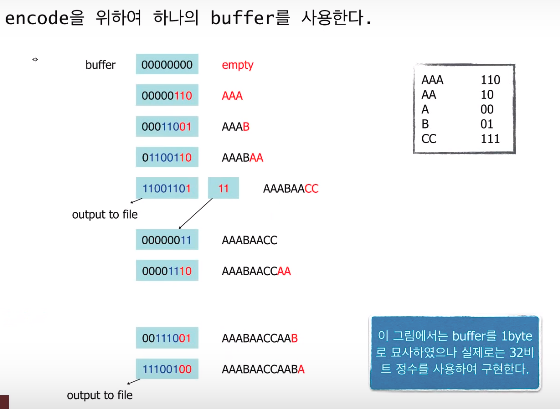인프런의 영리한 프로그래밍을 위한 알고리즘 강좌를 보고 작성한 문서입니다.
인코딩하기
-
압축파일의 맨 앞부분(header)에 파일을 구성하는 run들에 대한 정보를 기록한다.
-
이때 원본 파일의 길이도 함께 기록한다(왜 필요할까?)
outputFrequencies
// fIn은 입출할 파일, fOut은 압축된 파일이다.
private void outputFrequencies(RandomAccessFile fIn, RandomAccessFile fOut) throws IOException {
// 먼저 run의 개수를 하나의 정수로 출력한다.
fOut.writeInt(runs.size());
// 원본 파일의 크기(byte단위)를 출력한다.
fOut.writeLong(fIn.getFilePointer());
// 각각의 run들을 출력한다.
for (int j =0; j < runs.size(); j++){
Run r = runs.get(j);
fOut.write(r.symbol); //write a byte
fOut.writeInt(r.runLen);
fOut.writeInt(r.freq);
}
}
compressFile
// fIN은 압축할 파일, inFileName은 그 파일의 이름이다. 파일의 이름을 추가로 바든ㄴ 이유는 압축된 파일의 이름을 정하기 위해서이다.
public void compressFile(String inFileName, RandomAccessFile fIn) throws IOException {
// 압축파일의 이름은 압축할 파일의 이름에 확장자를 .z를 붙인 것이다.
String outFileName = new String(inFileName + ".z");
// 압축파일을 여기서 생성하여 outputFrequencies와 encode메서드에게 제공한다.
RandomAccessFile fOut = new RandomAccessFile(outFileName, "rw");
collectRuns(fIn);
outputFrequencies(fIn, fOut);
createHuffmanTree();
assignCodewords(theRoot, 0, 0);
storeRunsIntohashMap(theRoot);
fIn.seek(0);
encode(fIn, fOut);
}
main
public class HuffmanCoding {
...
public void compressFile(String inFileName, RandomAccessFile fIn) throws IOException {
...
}
static public void main(String args[]){
HuffmanCoding app = new HuffmanCoding();
RandomAccessFile fIn;
try {
fIn = new RandomAccessFile("sample.txt", "r");
app.copressFile("sample.txt", fIn);
fIn.close();
} catch (IOException io) {
System.err.println("Cannot open " + fileName);
}
}
}
encode()

private void encode(RandomAccessFile fIn, RandomAccessFile fOut) {
while there remains bytes to read in the file {
recongnise a run;
find the codeword for the rn;
pack the codeword into the buffer;
if the buffer becomes full
write the buffer into the compressed file;
}
if buffer is not empty {
append 0s into the buffer;
write the buffer into the compressed file;
}
}
class HuffmanEncoder
public class HuffmanEncoder {
static public void main(String args[]){
String fileName = "";
HuffmanCoding app = new HuffmanCoding();
RandomAccessFile fIn;
Scanner kb = new Scanner(System.in);
try {
System.out.print("Enter a file name: ");
fileName = kb.next();
fIn = new RandomAccessFile(fileName, "r");
app.compressFile(fileName, fIn);
fIn.close();
} catch (IOException io) {
System.err.println("cannot open " + fileName);
}
}
}
